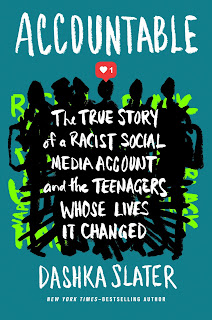Title: Accountable: The True Story of a Racist Social Media Account and the Teenagers Whose Lives It Changed
Author: Dashka Slater and Ariel Blake (Narrator)
Year published: 2023
Category: YA nonfiction
Pages: 496 pages
Rating: 4.5 out of 5
Location: (my 2023 Google Reading map): USA (CA)
Summary: When a high school student started a private Instagram account that used racist and sexist memes to make his friends laugh, he thought of it as “edgy” humor. Over time, the edge got sharper. Then a few other kids found out about the account. Pretty soon, everyone knew.
Ultimately no one in the small town of Albany, California, was safe from the repercussions of the account’s discovery. Not the girls targeted by the posts. Not the boy who created the account. Not the group of kids who followed it. Not the adults―educators and parents―whose attempts to fix things too often made them worse.
In the end, no one was laughing. And everyone was left asking: Where does accountability end for online speech that harms? And what does accountability even mean?
Review: The 57 Bus (link to my review) was a fantastic book so I figured this one would be great, too, and I wasn't wrong. There are so many awful social media accounts out there that I think focusing on one so that we see the impact on everyone involved is very impactful.
This is such an intense and important story and well narrated. The events are hurtful to the people who were targeted and I am always amazed by how unaware the perpetrators are. How are racist and mysogynist memes, photos, and comments ever funny or ok? The boys were suspended from school for multiple days, but it seems like the adults (and some of the boys) didn't realize the impact of the account. Of course, the repercusions and lawsuits went on for a couple years.
I think what makes this especially difficult is that teenagers' brains are not fully formed. That's not an excuse, but perhaps an explanation as to why some of them responded the way they did. And along these lines, the students body as a whole wanted action, accountability, and more. The police got involved and things escalated quickly.
One theme is the concept of "dark humor," using racist, anti-semitic, mysogynist comments to humor one's friends. I just don't get it. The book also talks about the bystander effect, in this case, the boys who "followed" the Instagram account and did nothing to stop it. I had this experience in Zanzibar this summer. While visiting a museum, my daughter and I saw a woman being shoved into a car and she was clearly struggling. My daughter's response was "don't do anything, it's not our business" while I was trying to figure out what I could safely do to help her. Then we realized they were filming a movie! The whole thing only lasted about 10 seconds but really made me think about how to intervene, especially when it might be dangerous or unsafe.
This really is an incredible story and getting to each of the people involved made it very poignant.
Challenges for which this counts:





No comments
Post a Comment